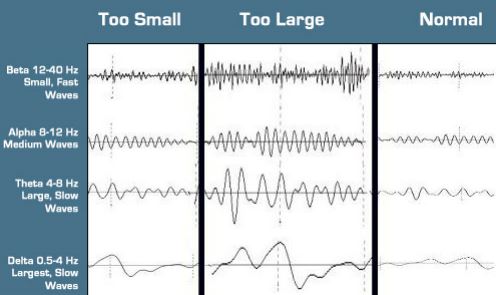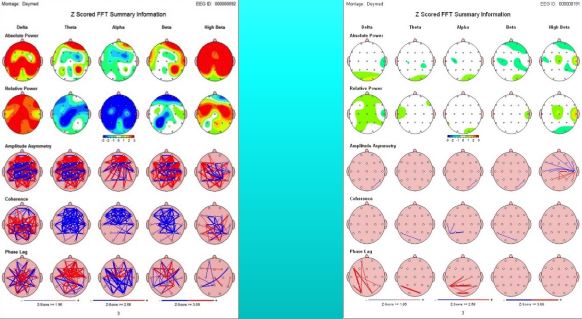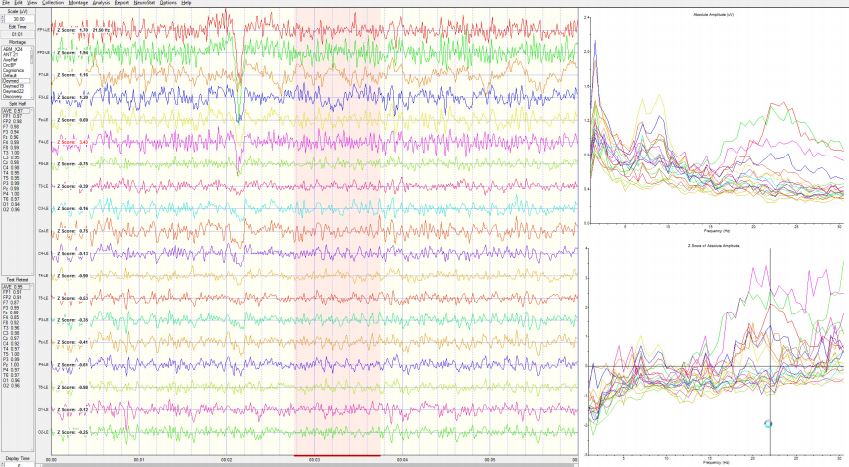Difference between revisions of "Neurofeedback"
Roger.puig (talk | contribs) (→Neuroguide) |
|||
| (54 intermediate revisions by 4 users not shown) | |||
| Line 1: | Line 1: | ||
| − | What is Neurofeedback? | + | == What is Neurofeedback? == |
| − | |||
Neurofeedback is a type of biofeedback that uses real time displays of electroencephalography (EEG) to illustrate brain activity. EEG features are extracted | Neurofeedback is a type of biofeedback that uses real time displays of electroencephalography (EEG) to illustrate brain activity. EEG features are extracted | ||
| − | and displayed allowing the user to study its temporal evolution in real-time. The goal of Neurofeedback is to monitor and present the patterns to be trained so that way the patient learns how to self-regulate them. Measured levels are transformed into commands that are used to control a game application. This kind of treatment can be used in medical applications (to treat autism, anxiety, depression, ADHD, etc.) and also for cognitive enhancement, relaxation meditation, concentration, attention or impulsivity | + | and displayed allowing the user to study its temporal evolution in real-time. The goal of Neurofeedback is to monitor and present the patterns to be trained so that way the patient learns how to self-regulate them. Measured levels are transformed into commands that are used to control a game application. This kind of treatment can be used in medical applications (to treat autism, anxiety, depression, ADHD, etc.) and also for cognitive enhancement, relaxation meditation, concentration, attention or impulsivity training among others and other conditions related to brain function (epilepsy, chronic pain, addiction,etc.) |
See the recent review by [http://www.ncbi.nlm.nih.gov/pubmed/24321363 Arns et al 2013] on the application of Neurofeedback to ADHD for in-depth information about protocols and success cases. | See the recent review by [http://www.ncbi.nlm.nih.gov/pubmed/24321363 Arns et al 2013] on the application of Neurofeedback to ADHD for in-depth information about protocols and success cases. | ||
| + | |||
| + | Originally, Neurofeedback was done by training patients to alter aspects of their actual brainwave signals (''Raw'', EEG): | ||
| + | |||
| + | [[File:orignially neurofeedback.JPG| 500 px]] | ||
| + | |||
| + | |||
| + | Today, Neurofeedback more commonly refers to training patients to change aspects of their quantitative EEG (''qEEG'') brain maps that have been shown to be causally related to their symptoms. | ||
| + | |||
| + | [[File:today.JPG| 500 px]] | ||
| + | |||
| + | |||
EEG presents rhythmic patterns that can be associated to mental and physiological states that are frequently studied in terms of frequency bands power. Studying a certain frequency band at an electrode or group of electrodes many physiological parameters can be extracted such as: | EEG presents rhythmic patterns that can be associated to mental and physiological states that are frequently studied in terms of frequency bands power. Studying a certain frequency band at an electrode or group of electrodes many physiological parameters can be extracted such as: | ||
<p> | <p> | ||
| Line 25: | Line 35: | ||
</p> | </p> | ||
| + | == Neurofeedback and ADHD == | ||
| + | Attention deficit hyperactivity disorder (ADHD) is one of the most common psychiatric disorder in children. For over 50 years Ritalin and amphetamine derives have been used to treat ADHD. Even | ||
| + | if they are considered safe drugs, they do have frequent side effects. Neurofeedback (NF) opens new possibilities for ADHD care providing a side effect free treatment. See the recent review by [http://www.ncbi.nlm.nih.gov/pubmed/24321363 '''Arns et al 2013'''] on the application of Neurofeedback to ADHD for in-depth information about protocols and success cases. | ||
| − | |||
| − | + | Attention and impulsivity can be detected in the EEG. The calculated ADHD feature is displayed to the patient by means of a video game he has to control based on his | |
| + | attention and hyperactivity measured levels. During neurofeedback treatment children learn how to regulate self-regulate them by playing video games. | ||
| + | = Neuroguide = | ||
| + | Neuroguide is: | ||
| + | • An FDA Registered Database of Normative qEEG Values | ||
| − | + | • A computer program that can compare the qEEG values of a given patient to the normative database and comparative produce brain maps | |
| − | + | • A system for collecting and recording (“acquiring”) EEG in real time | |
| − | |||
| − | |||
| − | |||
| − | |||
| − | |||
| − | + | • A set of tools for doing Neurofeedback on patients to help them retrain the brain functioning in order to address their behavioral health problems | |
| − | + | • A research tool for doing statistical analyses on groups of brain maps | |
| − | |||
| − | |||
| − | |||
| − | |||
| − | |||
| − | |||
| − | |||
| − | |||
| − | |||
| − | |||
| − | |||
| − | |||
| − | |||
| − | |||
| − | |||
| − | |||
| − | |||
| − | |||
| − | |||
| − | |||
| − | |||
| − | + | • Many other uses | |
| − | + | [[File:neuroguidepicture.JPG| 500 px]] | |
| − | |||
| − | |||
| − | |||
| − | |||
| − | |||
| − | |||
| − | |||
| − | |||
| − | |||
| − | |||
| − | |||
| − | |||
| − | |||
| − | |||
| − | |||
| − | |||
| − | |||
| − | |||
| − | |||
| − | |||
| − | |||
| − | |||
| − | |||
| − | |||
| − | |||
| − | |||
| + | https://www.youtube.com/watch?v=IpbvFxyL3yE | ||
| − | + | NeuroGuide is the most advanced and scientifically validated system for analyzing brain function and doing neurofeedback: | |
| − | + | • Trains Only Z-scores of qEEG metrics, not absolute values | |
| − | + | • Symptom driven – doesn’t “chase dysregulations” | |
| − | |||
| − | + | • Analyzes and rewards qEEG normalization using 3-D real time brain imaging (LORETA) | |
| − | + | • Based on the Node-Network Hypothesis of Cortical Functioning | |
| − | + | • Can train Surface Power, Connectivity, Current Sources (3-D) or a combination of these | |
| − | |||
| − | |||
| − | |||
| − | |||
| − | |||
| − | |||
| − | |||
| − | |||
| − | |||
| − | |||
| − | |||
| − | |||
| − | |||
| − | |||
| − | |||
| − | |||
| − | + | For more information you can check the Neuroguide workshop link: | |
| − | + | http://www.neuroguideworkshops.com/NeuroGuide%20Affiliate%20Workshop-January%202016.pdf | |
| − | |||
| − | + | NeuroGuide-2.9.6 contains the interface with NIC to be used with our systems (Enobio 20/32 and Starstim 20/32) | |
| − | + | Here is an url to prices and order webpage: https://appliedneuroscience.com/online-store/ | |
| − | |||
| + | For Enobio-20/32 and Starstim-20/32 integration with Neuroguide visit the following link with a user guide : | ||
| − | + | http://www.neuroelectrics.com/wiki/index.php/File:Neuroguide_user_manual_3.pdf | |
Latest revision as of 09:41, 6 August 2020
What is Neurofeedback?
Neurofeedback is a type of biofeedback that uses real time displays of electroencephalography (EEG) to illustrate brain activity. EEG features are extracted and displayed allowing the user to study its temporal evolution in real-time. The goal of Neurofeedback is to monitor and present the patterns to be trained so that way the patient learns how to self-regulate them. Measured levels are transformed into commands that are used to control a game application. This kind of treatment can be used in medical applications (to treat autism, anxiety, depression, ADHD, etc.) and also for cognitive enhancement, relaxation meditation, concentration, attention or impulsivity training among others and other conditions related to brain function (epilepsy, chronic pain, addiction,etc.)
See the recent review by Arns et al 2013 on the application of Neurofeedback to ADHD for in-depth information about protocols and success cases.
Originally, Neurofeedback was done by training patients to alter aspects of their actual brainwave signals (Raw, EEG):
Today, Neurofeedback more commonly refers to training patients to change aspects of their quantitative EEG (qEEG) brain maps that have been shown to be causally related to their symptoms.
EEG presents rhythmic patterns that can be associated to mental and physiological states that are frequently studied in terms of frequency bands power. Studying a certain frequency band at an electrode or group of electrodes many physiological parameters can be extracted such as:
• Attention
• Impulsivity
• Mental Workload
• Stress
• Relaxation
Neurofeedback and ADHD
Attention deficit hyperactivity disorder (ADHD) is one of the most common psychiatric disorder in children. For over 50 years Ritalin and amphetamine derives have been used to treat ADHD. Even if they are considered safe drugs, they do have frequent side effects. Neurofeedback (NF) opens new possibilities for ADHD care providing a side effect free treatment. See the recent review by Arns et al 2013 on the application of Neurofeedback to ADHD for in-depth information about protocols and success cases.
Attention and impulsivity can be detected in the EEG. The calculated ADHD feature is displayed to the patient by means of a video game he has to control based on his
attention and hyperactivity measured levels. During neurofeedback treatment children learn how to regulate self-regulate them by playing video games.
Neuroguide
Neuroguide is:
• An FDA Registered Database of Normative qEEG Values
• A computer program that can compare the qEEG values of a given patient to the normative database and comparative produce brain maps
• A system for collecting and recording (“acquiring”) EEG in real time
• A set of tools for doing Neurofeedback on patients to help them retrain the brain functioning in order to address their behavioral health problems
• A research tool for doing statistical analyses on groups of brain maps
• Many other uses
https://www.youtube.com/watch?v=IpbvFxyL3yE
NeuroGuide is the most advanced and scientifically validated system for analyzing brain function and doing neurofeedback:
• Trains Only Z-scores of qEEG metrics, not absolute values
• Symptom driven – doesn’t “chase dysregulations”
• Analyzes and rewards qEEG normalization using 3-D real time brain imaging (LORETA)
• Based on the Node-Network Hypothesis of Cortical Functioning
• Can train Surface Power, Connectivity, Current Sources (3-D) or a combination of these
For more information you can check the Neuroguide workshop link:
http://www.neuroguideworkshops.com/NeuroGuide%20Affiliate%20Workshop-January%202016.pdf
NeuroGuide-2.9.6 contains the interface with NIC to be used with our systems (Enobio 20/32 and Starstim 20/32)
Here is an url to prices and order webpage: https://appliedneuroscience.com/online-store/
For Enobio-20/32 and Starstim-20/32 integration with Neuroguide visit the following link with a user guide :
http://www.neuroelectrics.com/wiki/index.php/File:Neuroguide_user_manual_3.pdf


